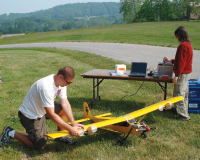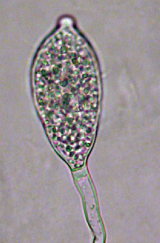
Features
Production
Research
Eye on Potatoes: Scientists study plant disease using unmanned aircraft
Scientists study plant disease using unmanned aircraft
March 4, 2008 By Michael Sutphin
A Virginia Tech plant pathologist known for his investigation of
microbial life in the lower atmosphere is using unmanned aerial
vehicles (UAVs) in a new, three-year study to detect, monitor, and
forecast the spread of late blight.
 |
| A student and lab technician work with the unmanned aircraft. Contributed photo
|
A Virginia Tech plant pathologist known for his investigation of microbial life in the lower atmosphere is using unmanned aerial vehicles (UAVs) in a new, three-year study to detect, monitor, and forecast the spread of late blight.
David Schmale, assistant professor of plant pathology, physiology, and weed science in the College of Agriculture and Life Sciences, hopes a recent grant of nearly $1 million from the U.S. Department of Agriculture (USDA) will help scientists better understand how Phytophthora infestans, a high-risk plant pathogen that causes late blight of potato and tomato, is transported through the atmosphere.
Other researchers on this project are Elson Shields, professor of entomology at Cornell University, and Donald Aylor,
distinguished scientist at the Connecticut Agricultural Experiment Station.
“Today, over 150 years after the Irish Potato Famine, P. infestans is still a major problem and a potential biosecurity threat,” said Schmale, who pointed out that Virginia’s last major outbreak of P. infestans was along the Eastern Shore in 1996. “Currently, there are no commercial varieties of potato that are completely resistant to the pathogen. The ability to track the movement of P. infestans in the atmosphere may assist in making rational and informed management decisions.”
Schmale has added six new hobby-size planes to his “air force” of nine UAVs. With the help of the Virginia Center for Autonomous Systems, a Virginia Tech research centre that facilitates collaboration in autonomous systems technologies, he has retrofitted these small aircraft with unique collection plates that open while the plane is in flight above potato fields at Virginia Tech’s Kentland Farm. The UAVs can collect samples of P. infestanstens to hundreds of metres above agricultural fields.
 |
| This photo shows the case or sporangium that contains Phytophthora infestans spores. Contributed photo
|
the potential spread of late blight so they can take appropriate measures to safeguard their crops.”
The USDA grant also provides funding for a new undergraduate course in the department of plant pathology, physiology, and weed science on “aerobiology” – the study of how organisms are transported in the atmosphere. The course, which begins in the third year of the grant, will be the first of its kind at Virginia Tech and will involve students participating in hands-on projects in aerobiology, biosecurity, and environmental science.
Print this page